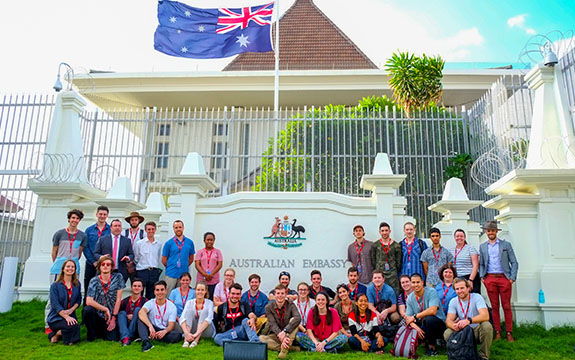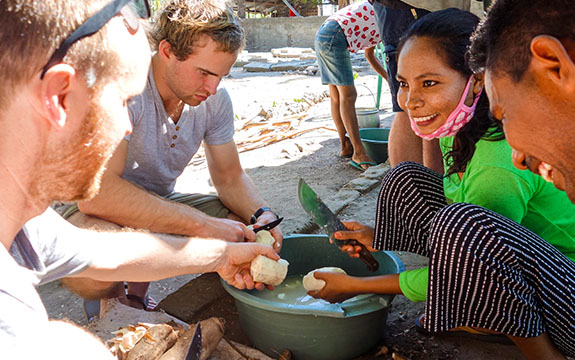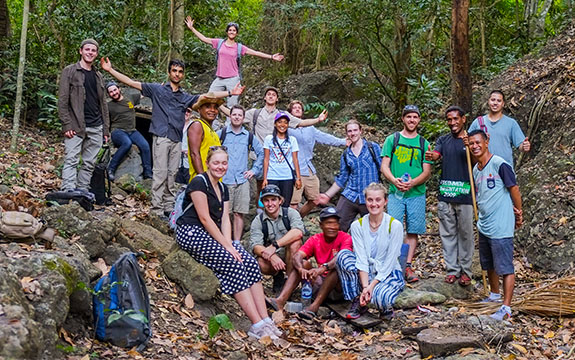Engineering innovation in Timor-Leste

In Summary
- Swinburne’s Engineering Practice Academy partners with Engineers Without Borders Australia to create immersive in-country experience in Timor-Leste.
- Program taught 26 students about the complexity of engineering projects and how to handle the requests of multiple stakeholders.
Swinburne’s Engineering Practice Academy partnered with Engineers Without Borders (EWB) Australia to create an immersive in-country experience in Timor-Leste.
The program, held in July, took students on a journey to show the direct impact their work can have, and helped build an understanding of how to create successful innovation in complex systems.
A total of 26 students from the schools of engineering and business took part in the intensive six-week program, co-facilitated by the Academy and EWB. The students learned about the complexity of engineering projects and how to handle the requests of multiple stakeholders.
The program included two weeks in Timor-Leste where students were joined by two engineers from the Timorese organisation for women in engineering, Feto Enginhera and the Project was supported by the Australian Government’s New Colombo Plan.
Exploring innovative ideas
EWB staff Bianca Anderson and Alison Stoakley, and Director of Community Partnerships at Swinburne’s Engineering Practice Academy, Jennifer Turner, developed a brief for the student teams.
“In Timor-Leste, EWB is exploring innovative ideas for the priority areas of access to clean water, gender-inclusive hygiene management and climate-resilient agriculture,” says Ms Turner.
“Every year, EWB’s education programs generate a huge number of ideas for engineering solutions and we thought ‘what if instead of generating new ideas we looked at the back catalogue and find ones from there that would be appropriate for Timor-Leste?’”
“We decided the best approach would be for the students to investigate what makes innovation projects successful in Timor-Leste. By understanding what makes innovation successful, EWB can then screen ideas from their back catalogue to identify some that are appropriate for further investigation in Timor-Leste.”
The student experience
Bachelor of Product Design Engineering (Honours) student, Ryan Lanyon, who took part in the program, reflects that engineers need to consider the capabilities of the communities they are working with and to ensure the solutions they propose can be maintained long-term.
“It was great to be there to really understand the challenges of the Timorese communities. I realise that without this knowledge you can’t bring about successful innovation. A big realisation for me was that you need to find the right technology for the community and education can be just as powerful as an engineering solution,” says Ryan.

The program included two weeks in Timor-Leste where students were joined by two engineers from the Timorese organisation for women in engineering.
“I saw high-tech systems had been installed that were not appropriate for the local area and the communities didn’t have the specialist resources to maintain them.”
Bachelor of Engineering Practice (Honours), Olivia McIlroy, says the opportunity to be immersed in the culture and to work closely with the communities gave her a new appreciation for understanding user needs before jumping to solutions.
“Usually we’re working with engineers from large organisations and the briefs are quite focused. Being in a completely different culture put me out of my comfort zone for sure—but it was the best way to see how the people who we are designing for really live, what their needs are. I found I had to spend much more time conversing with stakeholders to really understand their situation before even thinking about solutions,” says Olivia.
Delivering in-country experiences
EWB Engineering Education Manager, Alison Stoakley, says that co-creating this program with the Academy allowed for new ways of delivering in-country experiences.
“The EWB and Swinburne partnership is a platform that enables us to think creatively about how we want to work together to achieve our aims,” says Ms Stoakley.
"We were really excited by the opportunity to work with the expertise in the Academy to co-create and pilot a new iteration of our student study tours—the immersive in-country experience—aimed at deeper curriculum-integration and links with other EWB program areas.”

The project was supported by the Australian Government’s New Colombo Plan.
Additionally, Ms Stoakley shared that this program allowed EWB to create more implementable engineering solutions for the communities they work with.
“This immersive experience was an incredible opportunity for EWB to discover how students might support the further research and development required to turn an innovative idea into an appropriate, implementable solution.”
A successful outcome for all
The program has been a success and there was significant benefit to the Timorese communities, shares Ms Turner.
“Almost all our in-country experiences contributed to the communities we worked with. Our guides were from the communities we visited and the majority of our accommodation was in home stays. This means we were able to contribute directly to local economies and make personal connections with Timorese people.
“This approach shows that it is possible to create a win-win situation in which students, partners, and communities all benefit. The Academy and EWB are excited to continue collaborating on impact-oriented projects. Even more exciting is that, thanks to this collaboration, we see the way forward for global mobility to be curriculum-integrated.”

